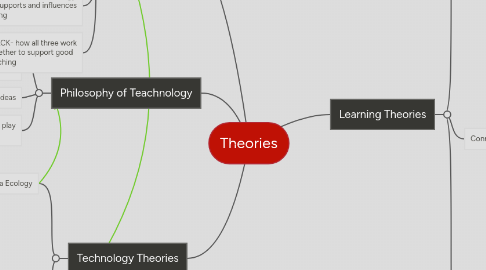
1. Technology Theories
1.1. Media Ecology
1.1.1. Principles
1.1.1.1. The study of media as environments
1.1.1.2. Technology has strong influences on society
1.1.1.3. Technology affects the way we see the world
1.1.2. Implications for education
1.1.2.1. Media can affect human perception, understanding, feelings and values
1.1.2.2. Digital era
1.2. Social Construction of Technology (SCOT)
1.2.1. Principles
1.2.1.1. Human actions shape technology
1.2.1.2. Look to the social world to understand why technology is a success or failure
1.2.2. Implications for education
1.2.2.1. Society and human actions influence technology
1.2.2.2. Understand how technology is embedded in social context
2. Philosophy of Teachnology
2.1. A teacher's personal philosophy about how teacher's use technology as a teaching tool
2.2. Personal values and ideas
2.3. The roles technology should play in the classroom
3. TPACK
3.1. Technology Pedagogy Content Knowledge
3.2. Technology Knowledge- knowledge about different types of technology tools that can be integrated into teaching and how to use them
3.3. Content Knowledge- Knowledge about the subject area
3.4. Pedagogical Knowledge- Knowledge about how to teach
3.5. PCK-effectively teaching the content
3.6. TCK- how technology relates to content
3.7. TPK- how to use technology that supports and influences learning
3.8. TPACK- how all three work together to support good teaching
4. Learning Theories
4.1. Cognitive Load
4.1.1. Principles
4.1.1.1. Learning is viewed as a process of inputs, managed in short-term memory and stored in long-term memory
4.1.1.2. Long-term memory is where we store our long-term knowledge
4.1.1.3. Working (short-term) memory is when we take in information and then moves it to long-term memory
4.1.1.4. Knowledge is constructed mentally through an 'information processor'
4.1.1.5. Generalizes fundamental knowledge structures and apply to similar situation
4.1.2. Implications for education
4.1.2.1. Remember ways of thinking through rules, patterns and strategies
4.1.2.2. Information overload of working memory can impair learning
4.1.2.3. Mental processes of how to think, perceive, remember and learn knowledge
4.2. Connectivism
4.2.1. Principles
4.2.1.1. Knowledge exists for the learner to find
4.2.1.2. Learning rests in a diversity of opinions
4.2.1.3. Connecting information sources
4.2.1.4. See connections between ideas and concepts
4.2.1.5. Develop networks
4.2.2. Implications for education
4.2.2.1. The teacher to provide activities for students to find and make connections
4.2.2.2. Maintaining connections is important
4.2.2.3. Learning occurs when students construct networks
4.3. Constructivism
4.3.1. Principles
4.3.1.1. Knowledge is actively constructed by learners
4.3.1.2. Learning involves personal discoveries
4.3.1.3. Use existing knowledge to build knowledge
4.3.1.4. Create knowledge as students attempt to understand their experiences
4.3.2. Implications for education
4.3.2.1. Directions are used to guide students
4.3.2.2. Through classroom discussion, students gain the skills of knowledge construction
4.3.2.3. Need to develop students' creative thinking
4.3.2.4. Teachers are facilitators
4.3.2.5. Learning through experiments and problem-solving
